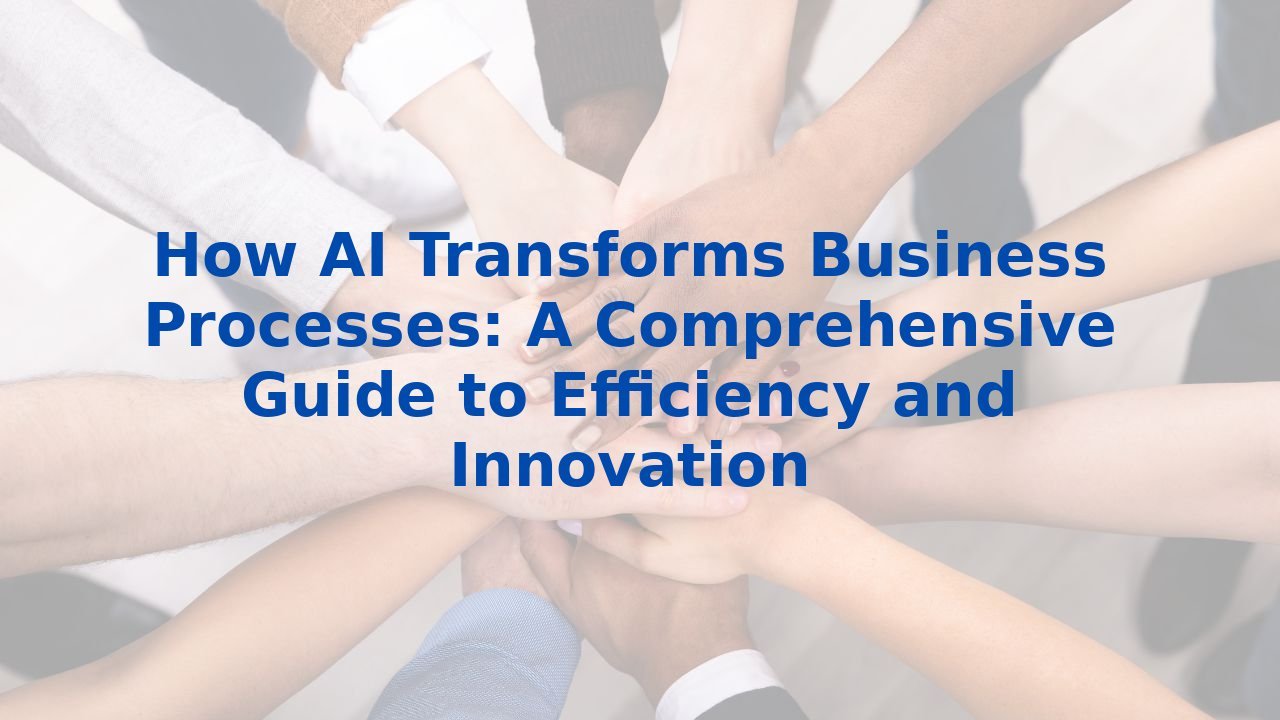How AI Transforms Business Processes: A Comprehensive Guide to Efficiency and Innovation
How AI Transforms Business Processes: A Comprehensive Guide to Efficiency and Innovation
In a world where speed and efficiency dictate success, businesses are incessantly on the lookout for innovative solutions to streamline their operations. Enter artificial intelligence (AI), an empowering tool that redefines traditional business processes. By incorporating AI, companies not only enhance efficiency but also unlock doors to unprecedented innovation.
Automating Routine Tasks
One of the most remarkable advantages of AI is its ability to eliminate tedious and repetitive tasks. Processes such as data entry, invoice processing, and appointment scheduling are prime candidates for automation. By employing AI-driven bots, businesses can reduce human error while enhancing speed and efficiency dramatically.
Imagine a workplace where employees are liberated from the mundane aspects of their roles, allowing them to immerse themselves in strategic initiatives that drive sustainable growth.
Process Optimization
AI's potential extends beyond automation; it serves as a cornerstone for optimizing business processes. By analyzing workflows, AI identifies bottlenecks, redundancies, and inefficiencies that might otherwise go unnoticed. This data-driven approach enables organizations to restructure their processes, automate manual tasks, and reallocate resources effectively, resulting in streamlined operations.
As a result, businesses see not only quicker task completion but also significant cost reductions, paving the way for enhanced productivity and operational excellence.
Quality Control and Assurance
When it comes to product quality, AI offers a game-changing approach to quality control. By monitoring manufacturing processes in real-time, AI-driven systems can detect defects and irregularities before they escalate. Early intervention not only prevents substandard products from reaching customers but also positively impacts brand reputation.
This proactive stance cultivates trust in the marketplace and fuels the pursuit of higher quality across all business facets.
Risk Management
In an age where risks lurk around every corner, AI stands as a formidable ally in risk management. By scrutinizing vast datasets, AI unearths potential threats while highlighting emerging opportunities. This capability allows organizations to navigate uncertainties more effectively, enabling them to make informed decisions based on predictive analytics.
As a result, organizations become more resilient and able to adapt to changing market conditions, fostering long-term sustainability.
Supply Chain Management
The fluidity of modern supply chains demands a level of precision previously unimaginable. AI equips businesses with the tools to analyze historical and real-time data, predicting demand fluctuations and optimizing inventory levels. Furthermore, it suggests efficient shipping routes, resulting in minimal delays and decreased carrying costs.
This creates a more responsive supply chain ecosystem, ensuring that organizations can meet customer demands swiftly and efficiently.
Employee Training and Productivity
AI also revolutionizes the way we think about employee training. AI-driven learning platforms tailor training materials to fit each employee's unique learning style, enhancing engagement and knowledge retention. By providing real-time assistance and relevant resources, these platforms empower employees, boosting their productivity and problem-solving capabilities.
Investing in employee training not only narrows the skills gap within the workforce but also amplifies operational efficiency across the board.
Fraud Detection
Security is paramount in today’s business landscape, and AI excels in the realm of fraud detection. Through advanced pattern recognition, AI swiftly identifies deviations in transaction data and user behavior. This rapid identification allows organizations to act quickly, safeguarding sensitive customer information and protecting company assets.
The Benefits of Training Employees for AI
While technology alone drives innovation, the human element remains critical. Training employees to work with AI is paramount for maximizing its benefits:
- Enhanced Collaboration: Employees proficient in AI tools can effectively collaborate with these systems, automating tasks and optimizing processes.
- Improved Decision-Making: Understanding AI empowers employees to make data-driven decisions, enhancing overall organizational performance.
- Adaptability: Well-trained employees navigate technological changes with agility, ensuring smooth transitions during transformations.
- Increased Productivity: With routine tasks automated, trained employees can focus on higher-level responsibilities, driving productivity and business success.
Conclusion
AI is more than just a buzzword; it is a transformative force that propels business efficiency and innovation to new heights. By automating routine tasks, optimizing processes, enhancing quality control, managing risks, and streamlining supply chains, organizations can indeed thrive in the competitive landscape. Moreover, investing in employee training equips teams with the skills necessary to leverage AI fully, leading to sustained success in an ever-evolving marketplace.
As you consider the future of your organization, remember that embracing AI isn’t just about integration—it’s about fostering a culture of innovation and preparedness for what’s to come.



